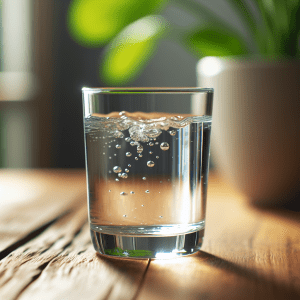Home water treatment systems can significantly improve water quality.
 Home water treatment systems can significantly enhance water quality by removing impurities, contaminants and unpleasant tastes or odors from tap water. These systems employ various filtration methods, such as activated carbon, reverse osmosis, or UV purification, to eliminate harmful substances like iron chlorine, lead, pesticides, and bacteria. By doing so, they ensure that the water is safer for drinking, cooking, and bathing. Moreover, improved water quality can benefit overall health, protect household appliances from mineral build-up, and provide peace of mind knowing that water is clean and safe.
Home water treatment systems can significantly enhance water quality by removing impurities, contaminants and unpleasant tastes or odors from tap water. These systems employ various filtration methods, such as activated carbon, reverse osmosis, or UV purification, to eliminate harmful substances like iron chlorine, lead, pesticides, and bacteria. By doing so, they ensure that the water is safer for drinking, cooking, and bathing. Moreover, improved water quality can benefit overall health, protect household appliances from mineral build-up, and provide peace of mind knowing that water is clean and safe.
Key Takeaways
- Home water treatment systems are essential for improving water quality. They remove 99.9% of harmful contaminants, leaving you with clean, pure water for drinking, cooking, and bathing.
- These systems are implemented through a variety of technologies. They use reverse osmosis, UV purification, and multi-stage filtration to safely remove or eradicate harmful contaminants.
- Key components such as filters, membranes, and UV lights improve treatment effectiveness, and routine maintenance keeps them performing at their best.
- You will reap the benefits of better health and safety. Further, you’ll experience improved water flavor and odor, skin and hair protection, and diminished scale accumulation in your devices and plumbing.
- No system is appropriate for all households or all water quality concerns. These systems range from whole-house filtration to activated carbon filters to water softeners.
- Select an appropriate system by testing water quality and determining your home’s needs based on water usage. Next, compare features and costs, and consider installation and maintenance requirements.
A certified home water treatment system is a convenient way to consistently provide high-quality water for all your daily needs. It addresses old standbys such as removing impurities, unpleasant tastes, and odors, guaranteeing cleaner and safer water for drinking, cooking, and all your household needs.
These systems are pretty variable. Choose from under-sink filters, whole-house systems, or countertop models to fit your unique water concerns and lifestyle. A quality whole-home water treatment system will significantly reduce contaminants, including chlorine, lead, and sediment.
 It improves your home’s water quality and ensures your family’s peace of mind. These systems improve home water and encourage healthier lifestyles. They deliver real, tangible benefits without the headaches of complex installations or ongoing maintenance, proving to be a smart, reliable, elegant choice for any home.
It improves your home’s water quality and ensures your family’s peace of mind. These systems improve home water and encourage healthier lifestyles. They deliver real, tangible benefits without the headaches of complex installations or ongoing maintenance, proving to be a smart, reliable, elegant choice for any home.
What Are Home Water Treatment Systems
1. Definition and Purpose
Home water treatment systems, especially whole-house water filtration systems, offer effective remedies to improve the water’s safety for cooking, cleaning, and bathing. They are necessary for advancing equity and a healthier future. These systems provide peace of mind that the water used for drinking, cooking, and bathing is free from harmful contaminants such as bacteria, chemicals, and sediment.
These systems effectively address specific contaminants, including lead and chlorine, while removing emerging contaminants like PFOA and PFOS. Their mission goes far beyond providing safe infrastructure; they enhance water quality by tackling problems such as hardness. This prevents scale from accumulating in appliances and eliminates contaminants that interfere with taste and smell, ensuring great-tasting water.
Many households face distinct water quality issues based on their geographic location or source of water supply. Treatment systems, including advanced water systems and whole-house water filters, are uniquely suited to meet these individual needs.
These issues can often be addressed comprehensively using whole-house filtration, reverse osmosis, or high-efficiency well water filter systems, providing a comprehensive water treatment solution for every household.
2. How They Work
Home water treatment systems work through fundamental principles of filtration—physical, chemical, or biological—to remove various substances. In reverse osmosis (RO), for example, water is forced through a semi-permeable membrane, which physically rejects any impurities, effectively trapping them.
It’s important to note that RO systems usually waste 75% of all water. On the other hand, UV purification neutralizes microorganisms by exposing them to ultraviolet light, ensuring water is free from harmful pathogens.
These systems start with pre-filters designed to catch larger particles like sand and rust. Then, finer filters or membranes remove the smaller contaminants. Multi-stage filtration systems use a series of treatments, including carbon filters and UV lights, to ensure water is as clean as possible.
This new strategy greatly improves overall efficiency. It’s a layered approach that ensures water quality stays safe and clean to accommodate a range of household needs.
3. Common Features and Components
Home water treatment systems are only as good as their components. The combination of filters, membranes, and UV lights keeps contaminants out. Carbon filters are excellent at improving taste and odor, specifically the taste and odor of chlorine.
At the same time, UV lights are critical in disinfecting water. While distillation systems are highly effective, they are often the most costly option. Multi-stage filtration systems, which provide multiple layers of filtration to ensure the maximum amount of contaminants are removed, are a popular component of higher-end models.
Communities can deploy monitoring systems that actively monitor water quality. These systems can provide automatic notifications that let users know when maintenance is due or a filter needs replacing. Whole-house systems range from $1,000 to $6,000 and up.
They usually come equipped with the latest technology, making them a wise investment for years of improving water quality.
Benefits of Home Water Treatment Systems
1. Removing Harmful Contaminants
Home water treatment systems are key to removing harmful substances from drinking water. They are proven to remove bacteria, viruses, and chemical pollutants, keeping your family safe and healthy.
Systems specifically targeting nitrates and heavy metals work to protect your health by reducing these contaminants. They are essential to stopping preventable long-term harms like developmental delays and organ failure.
Depending on what you find in your local water quality reports, filtration systems can focus on removing specific contaminants. For example, if your area has high lead levels, a certified treatment option like NSF/ANSI 53 can significantly reduce this toxin, giving you peace of mind.
2. Improving Water Taste and Smell
More often than not, if you’ve ever been put off by an odd taste or smell in your tap water, home treatment systems are the solution. Activated carbon filters extensively remove foul odors and tastes from chlorine and other chemicals.
That results in better-tasting water for drinking and making food. Picture your morning coffee made only with the freshest, cleanest water—it’s not a huge adjustment to make, but the impact is profound.
3. Enhancing Skin and Hair Health
 This is because filtered water is much gentler on your skin and hair. Harsh chemicals and additives, such as chlorine, are known to dry and irritate skin.
This is because filtered water is much gentler on your skin and hair. Harsh chemicals and additives, such as chlorine, are known to dry and irritate skin.
It allows your skin’s natural moisture to remain intact. It even makes your hair softer and more manageable, enhancing your personal care routine.
Types of Home Water Treatment Systems
Choosing a whole-house water filtration system opens up a world of possibilities for homeowners. Each system is closely engineered to address individual water filtration needs and challenges, ensuring better water quality. Learning about the different types of whole-house water filters and their benefits will help you determine the right solution for your home.
1. Reverse Osmosis Systems
Reverse osmosis (RO) systems are popular because they can remove a large number of impurities through the use of a semi-permeable membrane. These systems reliably remove dissolved solids, heavy metals such as lead and copper, and nitrates for purer drinking water. They go after chemicals like chloride and sodium with impressive accuracy.
RO systems are small, making them an excellent option for kitchens with little room. However, they waste more than 75% of the water input while filtering. This is a very critical discovery to have on your radar. Regular maintenance is required, including monitoring salts and keeping pressure over 60 psi.
2. Activated Carbon Filters
Activated carbon filters improve the flavor and quality of drinking water by efficiently adsorbing harmful chemicals like chlorine, pesticides, and volatile organic compounds (VOCs).
These filters have different options, ranging from pitcher-based systems to under-sink installations, offering flexibility to meet diverse needs. They are most effective in removing foul odors and improving drinking water quality.
3. UV Purification Systems
UV purification systems eliminate bacteria and viruses by exposing them to ultraviolet light without adding harmful chemicals to the water. This process reduces pathogenic organisms by 99.99% or more, allowing for a natural water disinfection solution.
It requires pre-filtration to remove large particles and sediments to enhance UV efficacy. This is a highly dependable option for keeping water free from germs.
4. Whole House Filtration Systems
Whole-house filtration systems filter the water entering your home before it is distributed throughout. Because of that, pristine water comes from every tap, shower, and appliance.
These systems typically feature several stages of filtration, removing a broad array of contaminants to provide all-around protection. They are perfect for households that want a one-size-fits-all solution that delivers high-quality water to every tap in their home.
5. Water Softeners for Hard Water
Water softeners treat hard water problems by replacing minerals such as calcium and magnesium with sodium ions. This process helps avoid unwanted scale buildup in pipes and appliances, improving longevity.
Soft water has some other perks, too, like reducing soap usage by up to 75 percent and providing better skin and hair care. Choosing the right softener will be based on your household’s individual water hardness levels, for optimal results.
Navigating the complexities of water treatment systems can be challenging, but we are here to assist you every step of the way. Our expertise in this field allows us to provide valuable recommendations to ensure your family benefits from the highest quality water. Southern Maryland families can trust us to identify and suggest the most suitable water treatment systems tailored to their specific needs. Don’t hesitate to reach out for expert advice and guidance – we’re here to help you make informed decisions for your household’s water quality.


0 Comments